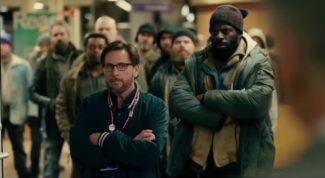The Public (Emilio Estevez, 2017)
Reviewed by Diana Diaz. Viewed at the Arlington Theater, Santa Barbara.
Most people think of Emilio Estevez as Martin Sheen’s younger son, or as the jock in The Breakfast Club (John Hughes 1985). The stamp of that heritage is still on this film. The Public leaves the protagonist, Stuart Goodson (Estevez), trapped in the library on lockdown, wearing what looks almost like a letterman jacket. This is a humorous tangent to the next point. The Estevez/Sheen family is well known through Martin Sheen’s activism and deep faith which he clearly passed on to son Emilio.
The draw of this film comes somewhat from a somewhat realistic depiction of the often overlooked – librarians and homeless people – as they deal with a severe winter chill. It was filmed on location with non-actors as extras in Cinncinati, Ohio at a multi-story, fluorescent-lit library. In that sense, it is firmly grounded in a 1970s style of gritty underdog-focused, realistic films.
The film commands a certain amount of charm and skill. Effective montage sequences feature one or two liners of people asking the kinds of mundane questions librarians hear every day. And the kind of situation the find themselves in, that libraries have become de facto daytime homeless shelters.
What initially seemed unbelievable was actually based on multiple true events. A plot point in the outset of the film is that a homeless man sued the library after being kicked out because he smells and other patrons feel uncomfortable. People have actually sued the library after having been kicked out due to an offensive personal odor, homeless or not.
Some of the objections to the film include the idea that the homeless depicted therein are too nice, together, and sanitized. However, one must realize that there are plenty of very nice people who become homeless and can’t get back on their feet without intervention. Goodson seems to understand that and is always kind to them. He’s also not much better off. No one ever became a librarian to get rich.
Kudos are owed to the well-crafted script. The women speak their own minds and become secondary protagonists when the camera begins to follow their point of view. Jena Malone unleashes her cute inner geek who obsesses about literature and her carbon footprint. The film even passes the famed Bechdel test which means that two named women in the film talk to each other about something other than a man. Stranger things have happened than hooking up with the building super, but it serves the story.
There are moments of humor and the casting was very good. Christian Slater gives a solid performance as an abrasive attorney. Alec Baldwin as a police detective is caught between a rock and a hard place. Jacob Vargas plays a security guard who comes across as friendly and funny. Taylor Schilling (Orange is the New Black) plays the building super. Gabrielle Union plays an ambitious, driven, and bitchy reporter with aplomb
Comic relief often comes from the homeless population with Michael Kenneth Williams having some pretty good zingers. Sometimes, though, it seemed mental illness was slightly trivialized. At the same time, saying that is a double-edged sword because few films give the homeless as much dignity as they have here. And some of the extras were really hired straight off the street.
The one piece that sometimes fit only 95% perfectly was writer/director/actor Occasionally it seems like he or the cast could have done some more rehearsal or the editor could have shaved just a touch more tightly. The cinematography is active and beguiling. And the film is still enjoyable as it attempts to tackle a real social issue in an honest, something that can always be a bit awkward. (That is, it can be awkward, unless you’re Jordan Peele and you know how to layer a social issues satire into a sci fi/horror/comedy version of Guess Who’s Coming to Dinner.)
About this entry
You’re currently reading “The Public (Emilio Estevez, 2017),” an entry on Student Film Reviews
- Published:
- 02.20.18 / 10pm
- Category:
- Films, Santa Barbara Film Festival 2018

No comments
Jump to comment form | comments rss [?]